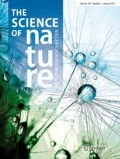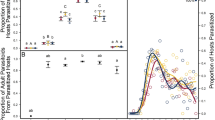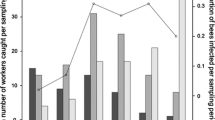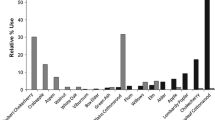Abstract
Two of the central goals of immunoecology are to understand natural variation in the immune system among populations and to identify those selection pressures that shape immune traits. Maintenance of the immune system can be costly, and both food quality and parasitism selection pressure are factors potentially driving immunocompetence. In tritrophic interactions involving phytophagous insects, host plants, and natural enemies, the immunocompetence of phytophagous insects is constrained by selective forces from both the host plants and the natural enemies. Here, we assessed the roles of host plants and natural enemies as selective pressures on immune variation among natural populations of Lobesia botrana. Our results showed marked geographical variation in immune defenses and parasitism among different natural populations. Larval immune functions were dependent of the host plant quality and were positively correlated to parasitism, suggesting that parasitoids select for greater investment into immunity in moth. Furthermore, investment in immune defense was negatively correlated with body size, suggesting that it is metabolically expensive. The findings emphasize the roles of host plants and parasitoids as selective forces shaping host immune functions in natural conditions. We argue that kinds of study are central to understanding natural variations in immune functions, and the selective forces beyond.





Similar content being viewed by others
References
Adamo SA, Lovett MME (2011) Some like it hot: the effects of climate change on reproduction, immune function and disease resistance in the cricket Gryllus texensis. J Exp Biol 214(12):1997–2004. doi:10.1242/jeb.056531
Ayres JS, Schneider DS (2009) The role of anorexia in resistance and tolerance to infections in Drosophila. Plos Biology 7 (7). doi:10.1371/journal.pbio.1000150
Ayres JS, Schneider DS (2012) Tolerance of infections. In: Paul WE (ed) Annual review of immunology, Vol 30, vol 30. Annual Review of Immunology. pp 271–294. doi:10.1146/annurev-immunol-020711-075030
Barnes AI, Siva-Jothy MT (2000) Density-dependent prophylaxis in the mealworm beetle Tenebrio molitor L (Coleoptera: Tenebrionidae): cuticular melanization is an indicator of investment in immunity. Proc R Soc B Biol Sci 267:177–182
Bryan-Walker K, Leung TLF, Poulin R (2007) Local adaptation of immunity against a trematode parasite in marine amphipod populations. Mar Biol 152(3):687–695. doi:10.1007/s00227-007-0725-x
Bukovinszky T, Poelman EH, Gols R, Prekatsakis G, Vet LEM, Harvey JA, Dicke M (2009) Consequences of constitutive and induced variation in plant nutritional quality for immune defence of a herbivore against parasitism. Oecologia 160(2):299–308. doi:10.1007/s00442-009-1308-y
Cerenius L, Soderhall K (2004) The prophenoloxidase-activating system in invertebrates. Immunol Rev 198:116–126. doi:10.1111/j.0105-2896.2004.00116.x
Coley PD, Bateman ML, Kursar TA (2006) The effects of plant quality on caterpillar growth and defense against natural enemies. Oikos 115(2):219–228
Corby-Harris V, Promislow DEL (2008) Host ecology shapes geographical variation for resistance to bacterial infection in Drosophila melanogaster. J Anim Ecol 77(4):768–776. doi:10.1111/j.1365-2656.2008.01399.x
Cornet S, Biard C, Moret Y (2009) Variation in immune defence among populations of Gammarus pulex (Crustacea: Amphipoda). Oecologia 159:257–269
Cotter SC, Simpson SJ, Raubenheimer D, Wilson K (2011) Macronutrient balance mediates trade-offs between immune function and life history traits. Funct Ecol 25(1):186–198. doi:10.1111/j.1365-2435.2010.01766.x
Delbac L, Lecharpentier P, Thiéry D (2010) Larval instars determination for the European grapevine moth (Lepidoptera: Tortricidae) based on the frequency distribution of head capsule widths. Crop Prot 29:623–630
Fievet V, Lhomme P, Outreman Y (2008) Predation risk cues associated with killed conspecifics affect the behavior and reproduction of prey animals. Oikos 117(9):1380–1385. doi:10.1111/j.2008.0030-1299.16629.x
Gabel B, Thiery D (1996) Oviposition response of Lobesia botrana females to long-chain free fatty acids and esters from its eggs. J Chem Ecol 22(1):161–171. doi:10.1007/bf02040207
Godin J, Maltais P, Gaudet S (2002) Head capsule width as an instar indicator for larvae of the cranberry fruitworm (Lepidoptera: Pyralidae) in southeastern New Brunswick. J Econ Entomol 95:1308–1313
Haine ER, Moret Y, Siva-Jothy MT, Rolff J (2008) Antimicrobial defense and persistent infection in insects. Science 322(5905):1257–1259. doi:10.1126/science.1165265
Hairston NG, Smith FE, Slobodkin LB (1960) Community structure, population control, and competition. Am Nat 94(879):421–425. doi:10.1086/282146
Hawkins BA, Cornell HV, Hochberg ME (1997) Predators, parasitoids and pathogens as mortality agents in phytophagous insect populations. Ecology 78:2145–2152
Hoffmann JA, Reichhart JM, Hetru C (1996) Innate immunity in higher insects. Curr Opin Immunol 8(1):8–13. doi:10.1016/s0952-7915(96)80098-7
Ilmonen P, Taarna T, Hasselquist D (2000) Experimentally activated immune defence in female pied flycatchers results in reduced breeding success. Proc R Soc B Biol Sci 267(1444):665–670
Iwanaga S, Lee BL (2005) Recent advances in the innate immunity of invertebrate animals. J Biochem Mol Biol 38(2):128–150
Kalbe M, Kurtz J (2006) Local differences in immunocompetence reflect resistance of sticklebacks against the eye fluke Diplostomum pseudospathaceum. Parasitology 132:105–116. doi:10.1017/s0031182005008681
Kapari L, Haukioja E, Rantala MJ, Ruuhola T (2006) Defoliating insect immune defense interacts with induced plant defense during a population outbreak. Ecology 87(2):291–296. doi:10.1890/05-0362
Klemola T, Klemola N, Andersson T, Ruohomaki K (2007) Does immune function influence population fluctuations and level of parasitism in the cyclic geometrid moth? Popul Ecol 49(2):165–178. doi:10.1007/s10144-007-0035-7
Kortet R, Rantala MJ, Hedrick A (2007) Boldness in anti-predator behaviour and immune defence in field crickets. Evol Ecol Res 9(1):185–197
Kraaijeveld AR, Godfray HCJ (1997) Trade-off between parasitoid resistance and larval competitive ability in Drosophila melanogaster. Nature 389(6648):278–280
Kraaijeveld AR, Vanalphen JJM (1995) Foraging behavior and encapsulation ability of Drosphila melanogaster larvae: correlated polymorphisms? (Diptera, Drosophilidae). J Insect Behav 8(3):305–314
Lazzaro BP, Little TJ (2009) Immunity in a variable world. Phil Trans R Soc B Biol Sci 364(1513):15–26. doi:10.1098/rstb.2008.0141
Linder JE, Owers KA, Promislow DEL (2008) The effects of temperature on host–pathogen interactions in D. melanogaster: who benefits? J Insect Physiol 54(1):297–308. doi:10.1016/j.jinsphys.2007.10.001
Lindstrom KM, Foufopoulos J, Parn H, Wikelski M (2004) Immunological investments reflect parasite abundance in island populations of Darwin's finches. Proc R Soc B Biol Sci 271(1547):1513–1519. doi:10.1098/rspb.2004.2752
Medzhitov R, Schneider DS, Soares MP (2012) Disease tolerance as a defense strategy. Science 335(6071):936–941. doi:10.1126/science.1214935
Moran MD (2003) Arguments for rejecting the sequential Bonferroni in ecological studies. Oikos 100(2):403–405. doi:10.1034/j.1600-0706.2003.12010.x
Moreau J, Benrey B, Thiery D (2006a) Assessing larval food quality for phytophagous insects: are the facts as simple as they appear? Funct Ecol 20(4):592–600. doi:10.1111/j.1365-2435.2006.01145.x
Moreau J, Benrey B, Thiery D (2006b) Grape variety affects larval performance and also female reproductive performance of the European grapevine moth Lobesia botrana (Lepidoptera: Tortricidae). Bull Entomol Res 96:205–212
Moreau J, Villemant C, Benrey B, Thiery D (2010) Species diversity of larval parasitoids of the European grapevine moth (Lobesia botrana, Lepidoptera: Tortricidae): the influence of region and cultivar. Biol Control 54(3):300–306. doi:10.1016/j.biocontrol.2010.05.019
Moret Y (2006) ‘Trans-generational immune priming’: specific enhancement of the antimicrobial immune response in the mealworm beetle, Tenebrio molitor. Proc R Soc B Biol Sci 273(1592):1399–1405. doi:10.1098/rspb.2006.3465
Moret Y, Schmid-Hempel P (2000) Survival for immunity: the price of immune system activation for bumblebee workers. Science 290(5494):1166–1168. doi:10.1126/science.290.5494.1166
Nakagawa S (2004) A farewell to Bonferroni: the problems of low statistical power and publication bias. Behav Ecol 15(6):1044–1045. doi:10.1093/beheco/arh107
Nappi AJ, Ottaviani E (2000) Cytotoxicity and cytotoxic molecules in invertebrates. Bioessays 22(5):469–480. doi:10.1002/(sici)1521-1878(200005)22:5<469::aid-bies9>3.0.co;2-4
Panzavolta T (2007) Instar determination for Pissodes castaneus (Coleoptera: Curculionidae) using head capsule widths and lengths. Environ Entomol 36:1054–1058
Peacor SD (2003) Phenotypic modifications to conspecific density arising from predation risk assessment. Oikos 100(2):409–415. doi:10.1034/j.1600-0706.2003.12043.x
Pletcher SD, Macdonald SJ, Marguerie R, Certa U, Stearns SC, Goldstein DB, Partridge L (2002) Genome-wide transcript profiles in aging and calorically restricted Drosophila melanogaster. Curr Biol 12(9):712–723. doi:10.1016/s0960-9822(02)00808-4
Ponton F, Wilson K, Cotter SC, Raubenheimer D, Simpson SJ (2011) Nutritional immunology: a multi-dimensional approach. PLoS Pathog 7 (12). doi:10.1371/journal.ppat.1002223
Povey S, Cotter SC, Simpson SJ, Lee KP, Wilson K (2009) Can the protein costs of bacterial resistance be offset by altered feeding behaviour? J Anim Ecol 78(2):437–446. doi:10.1111/j.1365-2656.2008.01499.x
Rantala MJ, Roff DA (2005) An analysis of trade-offs in immune function, body size and development time in the Mediterranean field cricket, Gryllus bimaculatus. Funct Ecol 19(2):323–330. doi:10.1111/j.1365-2435.2005.00979.x
Reznick D, Nunney L, Tessier A (2000) Big houses, big cars, superfleas and the costs of reproduction. Trends Ecol Evol 15(10):421–425. doi:10.1016/s0169-5347(00)01941-8
Roehrich R, Boller E (1991) Tortricids in vineyards. In: Van der Gesst LPS, Evenhuis HH (ed) Tortricid pests, their biology natural enemies and control. Elsvier, Amsterdam, pp 507–514
Sadd BM, Siva-Jothy MT (2006) Self-harm caused by an insect's innate immunity. Proc R Soc B Biol Sci 273(1600):2571–2574. doi:10.1098/rspb.2006.3574
Schmid-Hempel P (2003) Variation in immune defence as a question of evolutionary ecology. Proc R Soc B Biol Sci 270(1513):357–366. doi:10.1098/rspb.2002.2265
Schmid-Hempel P (2011) Evolutionary parasitology. Oxford University Press, Oxford
Sheldon BC, Verhulst S (1996) Ecological immunology: costly parasite defences and trade-offs in evolutionary ecology. Trends Ecol Evol 11(8):317–321. doi:10.1016/0169-5347(96)10039-2
Siva-Jothy MT, Moret Y, Rolff J (2005) Insect immunity: an evolutionary ecology perspective. In: Simpson SJ (ed) Advances in insect physiology, Vol 32, vol 32. Advances in Insect Physiology. pp 1–48. doi:10.1016/s0065-2806(05)32001-7
Siva-Jothy MT, Thompson JJW (2002) Short-term nutrient deprivation affects immune function. Physiol Entomol 27(3):206–212. doi:10.1046/j.1365-3032.2002.00286.x
Smilanich AM, Dyer LA, Chambers JQ, Bowers MD (2009) Immunological cost of chemical defence and the evolution of herbivore diet breadth. Ecol Lett 12(7):612–621. doi:10.1111/j.1461-0248.2009.01309.x
Thiéry D (2005) Vers de la grappe: les connaître pour s'en protéger. Vigne & Vin Publications Internationales, Bordeaux
Thiéry D (2008) Les ravageurs de la Vigne, 2nd edn. Féret, Bordeaux
Thiery D, Gabel B (1993) Inter-specific avoidance of egg-associated semiochemicals in 4 tortricids. Experientia 49(11):998–1001. doi:10.1007/bf02125648
Thiery D, Moreau J (2005) Relative performance of European grapevine moth (Lobesia botrana) on grapes and other hosts. Oecologia 143(4):548–557. doi:10.1007/s00442-005-0022-7
Tinsley MC, Blanford S, Jiggins FM (2006) Genetic variation in Drosophila melanogaster pathogen susceptibility. Parasitology 132:767–773. doi:10.1017/s0031182006009929
Torres-Vila LM, Stockel J, Rodriguez-Molina MC (1997) Physiological factors regulating polyandry in Lobesia botrana (Lepidoptera: Tortricidae). Physiol Entomol 22(4):387–393. doi:10.1111/j.1365-3032.1997.tb01184.x
Tschirren B, Richner H (2006) Parasites shape the optimal investment in immunity. Proc R Soc B Biol Sci 273(1595):1773–1777. doi:10.1098/rspb.2006.3524
Valtonen TM, Kleino A, Ramet M, Rantala MJ (2010) Starvation reveals maintenance cost of humoral ismmunity. Evol Biol 37(1):49–57. doi:10.1007/s11692-009-9078-3
Vogelweith F, Thiery D, Quaglietti B, Moret Y, Moreau J (2011) Host plant variation plastically impacts different traits of the immune system of a phytophagous insect. Funct Ecol 25(6):1241–1247. doi:10.1111/j.1365-2435.2011.01911.x
Vogelweith F, Thiéry D, Moret Y, Moreau J (2013) Immunocompetence increases with larval body size in a phytophagous moth. Physiol Entomol 38:219–225
Yang SY, Ruuhola T, Haviola S, Rantala MJ (2008) Effects of host-plant shift on immune and other key life-history traits of an eruptive Geometrid, Epirrita autumnata (Borkhausen). Ecol Entomol 33(4):510–516. doi:10.1111/j.1365-2311.2008.01000.x
Zuk M, Stoehr AM (2002) Immune defense and host life history. Am Nat 160:S9–S22. doi:10.1086/342131
Acknowledgments
We thank A. Bauer, A. Balourdet, O. Bonnard, L. Delbac, M. Gaillard, P. Kuntzman. Leroux, K. Monceau, P. Petitot, P. Pienne, D. Richy, J-P. Troussard, and A. Vincent-Boudrot. This study was supported by the Centre National de la Recherche Scientifique (CNRS) and grants from the Agence Nationale de la Recherche (ANR) (ANR-07-JCJC-0134 and ANR-08-JCJC-0006) and from the Regional Council of Bourgogne. We also thank the Regional Councils of Alsace, Aquitaine, Bourgogne, Champagne-Ardenne, PACA, and Rhône-Alpes. We thank the vine growers and vineyard owners who allowed us to sample in their vineyards.
Conflict of interest
We declare that we have no conflict of interest.
Author information
Authors and Affiliations
Corresponding author
Additional information
Communicated by: Sven Thatje
Rights and permissions
About this article
Cite this article
Vogelweith, F., Dourneau, M., Thiéry, D. et al. Geographical variation in parasitism shapes larval immune function in a phytophagous insect. Naturwissenschaften 100, 1149–1161 (2013). https://doi.org/10.1007/s00114-013-1119-1
Received:
Revised:
Accepted:
Published:
Issue Date:
DOI: https://doi.org/10.1007/s00114-013-1119-1




